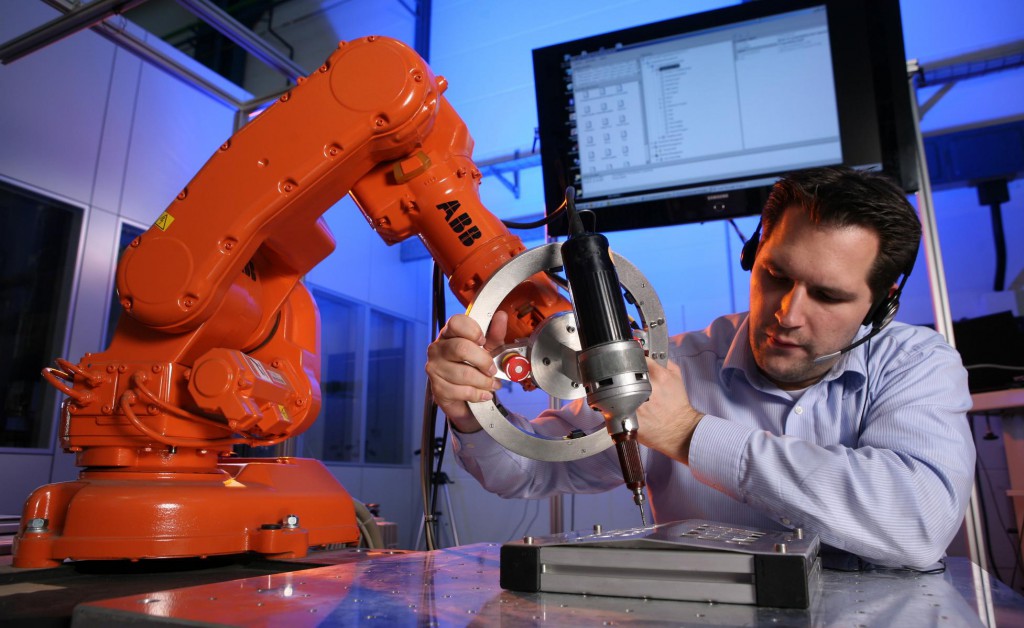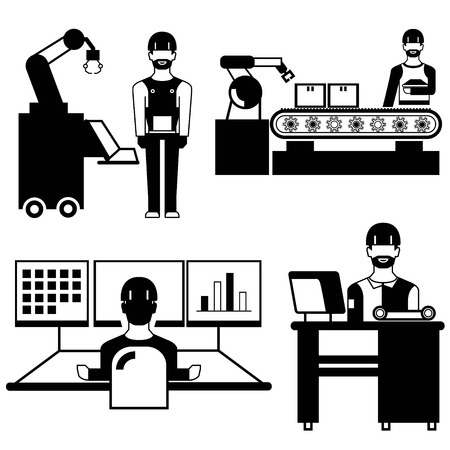
Robohub.org
How to benefit from the robotic skill shortage

SMErobot invention by ABB: Lead-Through-Programming (Image credit: ABB AG)
Robotics is going to be one of the biggest job creators in modern history. But are there enough qualified people to fill those jobs? As various sectors announce skill shortages, we looked at how robotics is affected and which skills are the most important for employers.
Despite scaremongering from media, studies have shown robotics is going to be a huge job creator. However those jobs may require particular skills that the current job market is struggling to provide.
Sources within the industry say that there aren’t enough skilled applicants to fill jobs in robotics and manufacturing. Plotr, a careers advice website, found that 52% of robotics engineering jobs in the UK are hard to fill, and almost all of these are due to skill shortages. A recent study by Deloitte predicted that 57% of US manufacturing jobs will be left unfilled over the next decade for the same reason.
What are skill gaps and skill shortages?
Skill gaps and skill shortages both refer to situations where there are not enough skilled people to fill the requirements of a job. Although they are similar concepts they are not exactly the same. A “skill gap” happens when a company’s existing workforce does not have the required skills to fulfill the job. A “skill shortage” happens when the job can’t be filled because there is a shortage of skilled applicants in the external job market.
Robotics can be affected by both. For example, bringing new robotic technology into the workplace can mean that existing workers don’t have the skills needed to operate them. This produces a skill gap, which can be filled by training and/or hiring new employees. However, a skill shortage in the wider job market may prove difficult to find the right applicant.

Source: Robotiq.com
Is there a skill shortage in robotics?
Jobs in robotics require quite a wide range of skills. Robotics spans several different fields, including mechanical engineering and computer science. To be effective, applicants need skills like systems analysis, critical thinking and complex problem solving. As a result of this, working with robots is a “skilled job”, whereas in the past, jobs in the same workplace may have been “unskilled”. Employers have reported finding it difficult to fill jobs, because their applicants don’t have the necessary level of technical skill needed to operate the robots.
A 2013 report by the International Federation of Robotics found that companies have been cutting back on low-paid, low-skill jobs since the beginning of the current global recession. This is apparently quite common during recessions. To replace these jobs, employers have been trying to improve the efficiency of their existing workforce, and robotics is one way to do this. However, this has led to the creation of skilled robotics jobs in many industries including manufacturing, electronics and the food industry. Unfortunately, this is often also combined with a skills gap in their existing workforce.
Skill shortages in the job market mean that many of these new positions are not being filled. A recent study by Deloitte Consulting and the Manufacturing Institute predicted that, of the 3.5 million US manufacturing jobs projected for 2015 to 2025, a huge 2 million of these positions will be left unfilled due to skill shortages.
Who is affected?
The skills shortage is likely to affect everyone, including employers, job seekers and the existing workforce.
- Employers need to provide training for their existing workforce, to ensure that a skills gap doesn’t develop which can’t be filled by hiring. The Deloitte study also found that involvement with local schools and community colleges can be effective, to ensure a future supply of engaged, skilled professionals.
- Job seekers need to ensure that they are continually developing. Training can be costly for employers, so coming to a job interview with existing technical skills could greatly increase the chances of landing the job.
- The existing workforce also needs to continually reeducate itself. Although robots are not replacing jobs directly, it does seem that many unskilled jobs are mutating into more skilled positions.
As Dan Kara, Practice Director of robotics at ABI Research, is quoted as saying
You don’t want to be in a place where your job can be replaced by automation or technology. You want to be in a place where you’re the master of automation technology.
The answer, then, seems to be continual training for everyone involved. No longer is it the case that you can stop learning after you have finished your degree, apprenticeship or other training course. Robotics technology is continually developing and it is the responsibility of the entire workforce to keep up with technology, or risk skill shortages and skill gaps such as we are seeing now.
The top skill robotics employers want
Although there are many technical skills required of robotics workers, there is one skill which comes up again and again and again and again.
So, what is that skill? …. Programming.
Today, programming is required even for jobs which would previously have been low skilled. Factory workers who operate robots need to have at least a basic understanding of programming, even if they won’t be writing lines of code.
tags: c-Education-DIY, collaborative robots, INDUSTRIAL ROBOTS







